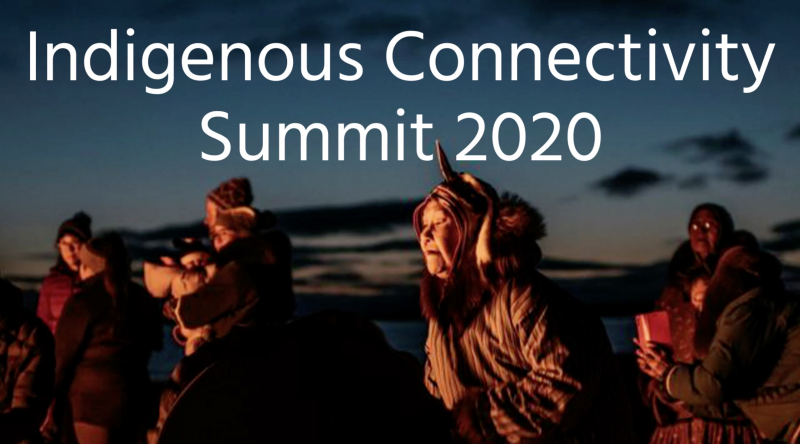Rising Voices note: Our monthly newsletter provides a summary of our recent blog posts about all aspects of digital inclusion including access and adoption of digital tools, as well as different ways and opportunities for communities to fully participate online. Read here for previous editions of this newsletter.
Hello readers, how’s your October going so far? Have you had a chance to join the Indigenous Connectivity Summit 2020, which has just concluded?
Due to the ongoing pandemic situation, this year's Summit was held virtually. The Internet Society brought together community stakeholders, along with researchers and policy makers, for conversations about the need for affordable, high-quality, and sustainable Internet access in Indigenous communities across North America. This event also served as a space for relationship building, exchange of practical experiences, as well as a platform for discussions such as how this infrastructure can support social and economic development in the community.
If you’ve missed out on the event or would like to revisit some of the sessions, you can find the recordings here.
MORE FROM THE RISING VOICES BLOG
Have you paid attention to how your state TV is doing when it comes to language diversity? How much airtime do you think is reasonable for a state TV to dedicate to indigenous languages?
Jermani Ojeda, a previous @ActLenguas guest host shared that in his home country of Peru only one hour is provided for the Quechua language, and this is being broadcasted in such an early time slot where “the audience numbers were the lowest”. Even that almost got pushed to another time when most of the target audience are likely still asleep. He argued that this reflects not only the colonial past of the country but also how it’s treating its indigenous peoples today. How does this matter? What does he suggest can be done to change the status quo? Read along and find out yourself. → “Peru's state TV broadcasts 23 hours in Spanish daily but only 1 hour in indigenous languages”
OPPORTUNITIES | SCHOLARSHIPS & FELLOWSHIPS
Concerned about how algorithms and Artificial Intelligence systems may add to or exacerbate the inequality as is when it comes to gender and race? The Alliance for Inclusive Algorithms invites you to apply for a six-month fellowship with them to explore how you may contribute to a more inclusive future with your knowledge and skill set (details here). Application due: October 22, 2020
CALLS FOR PARTICIPATION
In preparation for MozFest 2021, opening next March, Mozilla is seeking proposals to aid their planning of this annual event which is moving primarily online due to the ongoing pandemic. Concerned about online disinformation, discriminatory algorithms, and/ or about online safety for activists? Consider participating by submitting a proposal that focuses on strategies for a healthier Internet. Stay tuned as the submission period opens: October 26, 2020 – November 23, 2020
UPCOMING EVENTS & CONFERENCES
As we shared a few months back, the Creative Commons Global Summit will be happening entirely online this year and there’s still time to register yourself for this free event. Whether you are a curious newbie or dedicated supporter, please take this invitation and join folks of similar interests for some fun, virtually, right from where you are (details here). Date: October 19-23, 2020
TOOLS & RESOURCES
In promoting awareness/understanding of language diversity, Language Landscape is hosting a map showcasing languages actually spoken around the world. Furthermore, they are inviting you to add your language recordings to the map! Speak a minority and/or endangered language? Pay them a visit today and see how you could bring more visibility to your language.
Working with indigenous, endangered, under-documented, or minority languages? Wanting to learn more about archiving digitized and/or born-digital data or language materials for digital repository? The Archive of the Indigenous Languages of Latin America is offering an online course to help you with that — free of charge, no prior experience required (details here).
RESEARCH
Have you heard of MAIN (Multilingual Assessment Instrument for Narratives), developed to measure narrative skills acquisition in children? If you are curious about how to adapt this tool to support your pedagogy effort in a mother tongue based multilingual program, you shall find insight in this short paper by Zubair Torwali, former guest host of ours on @AsiaLangsOnline.
ADDITIONAL READINGS, LISTENINGS, and VIEWINGS
- Puppets, animation and song breathe new life into endangered language via Commonwealth of Australia (Department of Infrastructure, Transport, Regional Development and Communications, Office for the Arts)
- Poynter’s International Fact-Checking Network launches the first-ever coalition of major U.S. fact-checkers to debunk misinformation in English and Spanish via Poynter
- A popular Twitter handle that gave birth to a self-sustaining online media organisation — 263Chat via jamlab (the Journalism and Media Lab)
- “It is up to us to make things a bit more accessible” via Optometry Today
Subscribe to the Rising Voices Newsletter
Support our work
Since Rising Voices launched in 2007, we’ve supported nearly 100 underrepresented communities through training, mentoring, microgrants and connections with peer networks. Our support has helped these groups develop bottom-up approaches to using technology and the internet to meet their needs and enhance their lives.
Please consider making a donation to help us continue this work.




